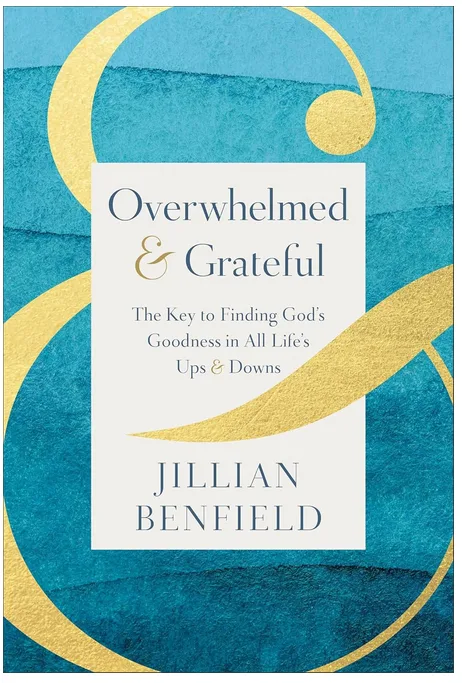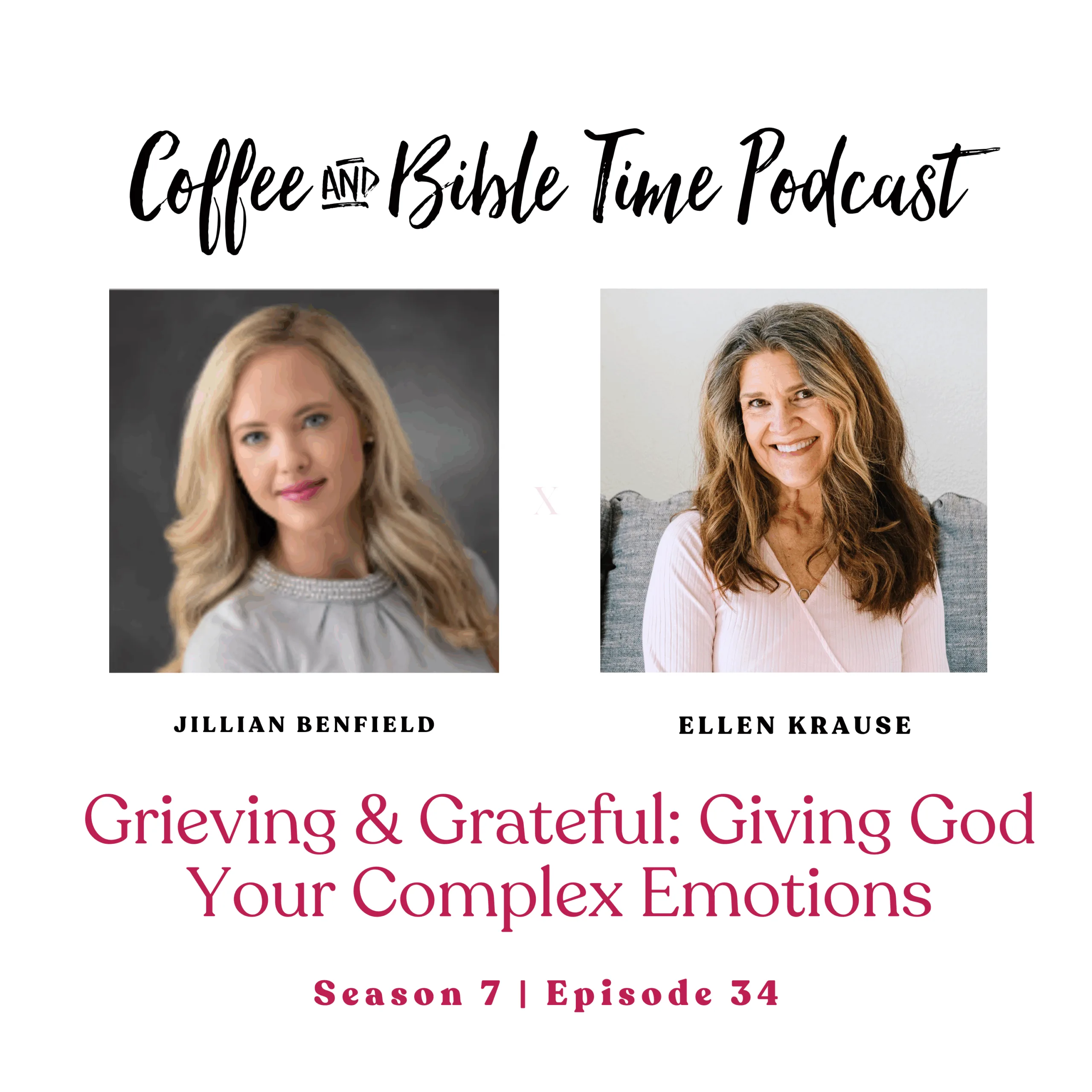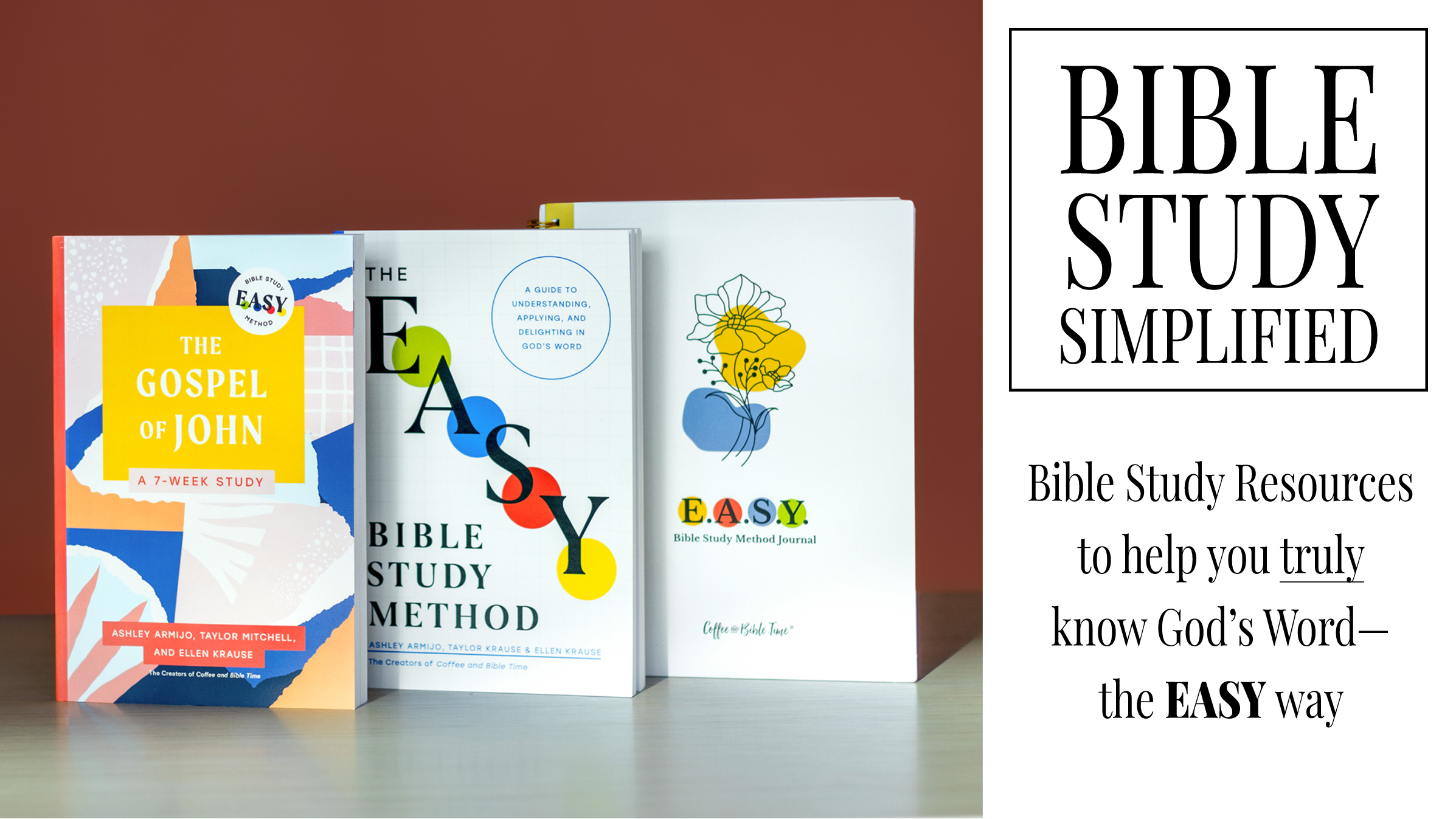About this episode:
What does it mean to live truthfully with complex emotions? Author Jillian Benfield joins us to share how parenting two medically complex children led her to deeper honesty with God—and freedom in holding both pain and praise.
Subscribe & Listen on:
TIMESTAMPS:
00:28 Introduction: When Emotions Are Complex
02:17 Disability & Unexpected Journeys
07:18 Making Space for Complex Emotions
10:24 Embracing ‘And’
14:17 What We Learn From Disabilities
16:19 A Spiritual Path Through Complex Emotions
18:25 Honesty and Gratitude in the Psalms
23:13 Order, Disorder, and Reorder
23:56 Resources and Guest Faves
The Conversation Continues in our Community:
23:57 The Connection Between Awe and Gratitude
25:23 Prayer Journaling: An Exercise in Thankfulness
Hosted by Ellen Krause
When Emotions Are Complex
Life rarely unfolds the way we expect. And when we’re in the midst of turmoil, our emotions often surprise us, as well.
Our lives are layered, messy, and full of complex emotions to match: joy and sorrow, peace and confusion, gratitude and grief.
But in those times, God doesn’t tell us to choose one emotion over the other. Instead, He welcomes us to bring our whole selves—including complex emotions—into His presence.
When we can be honest with God, ourselves, and others about how we’re really feeling, we make room for deeper connection, authenticity, and a life lived abundantly.

3 Ways to Begin Recognizing Complex Emotions in Your Life
- Pay attention to moments when joy and sorrow exist side-by-side.
Think after a birth or a death, becoming a caretaker for an aging parent, watching children leave the nest, graduating high school or college, or any life change that matters to you. The first thing to do is notice how you feel. - Notice the “but’s”.
When your friend asks how you’re doing and you say “My life is so busy right now…but it’s all good things!” take note of how you’re experiencing two contradictory feelings at once (e.g., tired and content, overwhelmed and grateful). Practice saying those things instead. - Name both positive and painful emotions in prayer.
God can handle your honesty! If Hannah (1 Samuel 1-2), David (Psalm 6), and even Jesus (Matthew 26:36-46; 27:46) gave their difficult feelings to the Father, then so can you.
Disability & Unexpected Journeys
Jillian Benfield, author of Overwhelmed & Grateful, shares how her life was turned upside down by a Down syndrome diagnosis for her second child, a miscarriage, and then a high-risk pregnancy.
Those life-altering moments brought a flood of complex emotions: shock, fear, grief, and gratitude, all tangled together.
“I had 18 specialists between the two boys at one point… I was drowning, and yet I was grateful, because it could have been so much worse.”
Jillian Benfield
In the middle of medical uncertainty and parenting three children, Jillian discovered that holding space for both the pain of difficult circumstances and the joy of miraculous healing was not only possible: it was godly.
Her story reminds us that when life takes unexpected turns, complex emotions aren’t a sign of spiritual weakness. Rather, they are a gateway to deeper faith. God meets us not in our clarity, but in our honesty of our lived experience.
When life takes unexpected turns, complex emotions aren’t a sign of spiritual weakness, but a gateway into deeper faith.
Coffee and Bible Time
Making Space for Complex Emotions
You don’t have to choose between gratitude and grief.
As Jillian fed her infant in a recliner, weary from multiple doctor appointments, she felt herself become overcome by complex emotions—exhaustion, love, relief, anxiety—and finally gave herself permission to experience both the pain and the praise.
American culture, both inside and outside the church, often pressures us to “just be grateful.”
But God is not threatened by our emotional contradictions. He invites us to bring all of our complex emotions to Him without shame.
Healing begins when we stop pretending and start praying from the whole of our hearts.
“I realized that I could be both. I could be sad over how hard my life was at that point… and I could also be grateful that the worst had not come to pass.”
Jillian Benfield

5 Ways to Make Space for Complex Emotions in Your Faith Life
- Allow conflicting emotions to sit side by side in prayer.
Bring it all to God—the good, the bad, and the ugly. He can take it. He’s probably experienced some of it. - Journal your gratitude and your grief in the same entry.
Notice where they intertwine, notice how they balance. Release them both to God. - Let go of the pressure to “fix” emotional tension.
You are not a bad Christian for feeling sad, or tired, or angry. Some emotions can’t be resolved overnight, and not all emotions are supposed to be. - Use Scripture (like the Psalms) to validate your emotional complexity.
God made you—emotions and all. Find characters in the Bible who have experienced similar feelings (Hagar, Hannah, Elizabeth, Deborah…the list goes on and on), and notice how God interacted with them. Find encouragement in that. - Remind yourself: God’s love isn’t dependent on your emotional clarity.
God isn’t confused about how He feels about you. Rest in His certainty.
Embracing the ‘And‘
When Jillian learned to replace her but’s with and’s, it transformed her perspective on parenting, faith, and the difficult parts of life.
With the challenge of learning how to parent and advocate for a child with disabilities, she explains how she’s constantly living in a space of complex emotions—anger and gratitude, disappointment and hope.
Rather than choosing one feeling over the other, Jillian learned to trust that God is present in the middle of it all. Embracing complex emotions isn’t a sign of spiritual confusion—it’s a sign of spiritual maturity.
Honesty and Gratitude in the Psalms
1 How long, O LORD? Will you forget me forever?
Psalm 13, NRSVue
How long will you hide your face from me?
2 How long must I bear pain in my soul
and have sorrow in my heart all day long?
How long shall my enemy be exalted over me?
3 Consider and answer me, O LORD my God!
Give light to my eyes, or I will sleep
the sleep of death,
4 and my enemy will say, “I have prevailed”;
my heart shall rejoice in your salvation.
5 But I trusted in your steadfast love;
my heart shall rejoice in your salvation.
6 I will sing to the LORD
because he has dealt bountifully with me.
The Psalms provide a powerful example for embracing complex emotions honestly with God.
Using Psalm 13 as an example, Jillian highlights how many Psalms begin in raw lament but end in hopeful trust and gratitude—showing us how to hold sorrow and praise side by side.
This spiritual honesty allows us to bring our whole selves before God without hiding pain or faking joy. Jillian reminds us that it’s okay to wrestle with mixed feelings, knowing that God’s love doesn’t waver in our messiness.
“The Psalms are such a lesson in being radically honest with God and also being completely alive to the goodness of God at the same time.”
Jillian Benfield
A Spiritual Path Through Complex Emotions
Borrowing from Walter Brueggemann’s study of the Psalms, Jillian introduces a biblical framework for understanding complex emotions: the rhythm of order, disorder, and reorder.
- Order: A stable, steady phase of life where things are functioning normally—challenges may exist, but life feels predictable and manageable.
- Disorder: A disruptive phase triggered by unexpected or difficult events (like loss or crisis) that upend normal life and bring confusion, pain, or grief.
- Reorder: A transformational phase where meaning, healing, and new life emerge—often through renewed awareness of divine presence and goodness following hardship.
Scripture invites us to live authentically through each emotional season. Whether you’re in a stable season of order, a disorienting season of pain, or slowly emerging into hope, God walks with you through it all.

3 Biblical Truths for Navigating Complex Emotions
- God honors your lament as much as your praise.
And often, when we start with honesty about our emotions, He works through that honesty to bring us to worship. - Every season has spiritual value.
Whether you’re in a place where you’re having consistent, fruitful time with Him, or you’re upset, discouraged, and hardly able to whisper a prayer, God is with you there. Turn to Him, even with your complex emotions, and He will welcome you with open arms. - The Psalms model emotional honesty as a sacred discipline.
Half of the Psalms are laments, and a handful more are imprecatory Psalms (Psalms that pray for justice or vengeance on the writer’s enemies). We are not only welcomed, but encouraged, to use that as a model of emotional honesty in our prayers.
Want even more of this conversation? Bonus content is posted every week on the Coffee and Bible Time Community!
Resources
Jillian’s Recommendations:
NRSVue Comfort Print
NIV Beautiful Word Bible
YouVersion Bible App

Overwhelmed & Grateful
We want to live with joy. But life is hard. Culture tells us to ignore the hard and focus on the positive. But science shows that actually makes us more depressed and physically ill.
In her transparent, hopeful way, Jillian Benfield shows how we can live with the joy Jesus promises–not by ignoring our dark circumstances and emotions, but by practicing a truer way of living: embracing the “&” in life.
Enjoyed this Conversation? Go Deeper with the Coffee and Bible Time Community
If you love the Coffee and Bible Time Podcast, you’ll love what’s waiting for you inside our online Christian Community—a welcoming space where women like you are growing in faith, friendship, and love for the Word of God.
As a Community member, you’ll unlock exclusive podcast bonus features available only to members.
But that’s just the beginning. Here’s what you’ll experience when you join:
- Exclusive Podcast Content
Enjoy members-only extras from our podcast: bonus segments, deep-dive discussions, and faith-building resources to help you live out what you’re hearing each week. - Weekly Women’s Online Bible Studies
Gather with Ashley, Taylor, and Ellen on Google Meet for mentor-led studies that bring Scripture to life. Share insights, pray together, and grow alongside a supportive, Christ-centered community. - 12-Course Bible Study Academy
Access our entire library of guided in-depth Bible study courses—perfect for growing in individual study, small groups, or mentoring relationships. Each course is designed to help you learn how to read God’s Word and apply it with confidence. - Christ-Centered Community & Encouragement
Connect with women who share your heart for Jesus. Through prayer requests, discussion threads, and regular check-ins, you’ll find lasting friendship and spiritual support. - 1-on-1 Mentoring with Ellen
Receive personal, prayerful guidance for your current season—whether you’re seeking direction in faith, purpose, or prayer life. (Scheduling details available inside the Community.)
Let’s learn and grow together. Join the Coffee and Bible Time Community today!


 Apple Podcasts
Apple Podcasts Spotify
Spotify
Leave a Reply